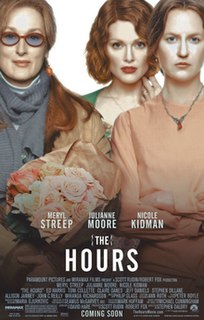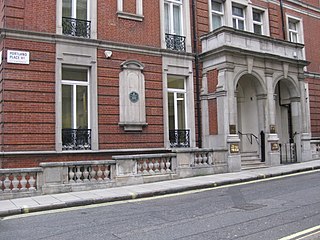Related Research Articles

Adeline Virginia Woolf was an English writer, considered one of the most important modernist 20th-century authors and also a pioneer in the use of stream of consciousness as a narrative device.
In literary criticism, stream of consciousness is a narrative mode or method that attempts "to depict the multitudinous thoughts and feelings which [sic] pass through the mind" of a narrator. The term was coined by Alexander Bain in 1855 in the first edition of The Senses and the Intellect, when he wrote, "The concurrence of Sensations in one common stream of consciousness enables those of different senses to be associated as readily as the sensations of the same sense" (p. 359). But it is commonly credited to William James who used it in 1890 in his The Principles of Psychology. In 1918, the novelist May Sinclair (1863–1946) first applied the term stream of consciousness, in a literary context, when discussing Dorothy Richardson's (1873–1957) novels. Pointed Roofs (1915), the first work in Richardson's series of 13 semi-autobiographical novels titled Pilgrimage, is the first complete stream-of-consciousness novel published in English. However, in 1934, Richardson comments that "Proust, James Joyce, Virginia Woolf & D.R. ... were all using 'the new method', though very differently, simultaneously". There were, however, many earlier precursors and the technique is still used by contemporary writers.

Mrs Dalloway is a novel by Virginia Woolf that details a day in the life of Clarissa Dalloway, a fictional high-society woman in post–First World War England. It is one of Woolf's best-known novels.

Plum Pie is a collection of nine short stories by P. G. Wodehouse, first published in the United Kingdom on 22 September 1966 by Barrie & Jenkins, and in the United States on 1 December 1967 by Simon & Schuster, Inc., New York. The collection's title is derived from P. G. Wodehouse's nickname, Plum.
Literary Impressionism is influenced by the European Impressionist art movement, many writers adopted a style that relied on associations. The Dutch Tachtigers explicitly tried to incorporate impressionism into their prose, poems, and other literary works. Much of what has been called "impressionist" literature is subsumed into several other categories, especially Symbolism, its chief exponents being Baudelaire, Mallarmé, Rimbaud, Verlaine and Laforgue. It focuses on a particular character's perception of events. The edges of reality are blurred by choosing points of view that lie outside the norm.

A Haunted House is a 1944 collection of 18 short stories by Virginia Woolf. It was produced by her husband Leonard Woolf after her death although in the foreword he states that they had discussed its production together.

The Hours is a 1998 novel written by Michael Cunningham. It won the 1999 Pulitzer Prize for Fiction, the 1999 PEN/Faulkner Award for Fiction, and was later made into an Oscar-winning 2002 film of the same name starring Nicole Kidman, Meryl Streep and Julianne Moore.

The Hours is a 2002 psychological drama film directed by Stephen Daldry and starring Meryl Streep, Julianne Moore, and Nicole Kidman. Supporting roles are played by Ed Harris, John C. Reilly, Stephen Dillane, Jeff Daniels, Miranda Richardson, Allison Janney, Toni Collette, Claire Danes, and Eileen Atkins. The screenplay by David Hare is based on Michael Cunningham's 1998 Pulitzer Prize-winning novel of the same title.

Margaret Maud Tyzack was an English actress. Her television roles included The Forsyte Saga (1967) and I, Claudius (1976). She won the 1970 BAFTA TV Award for Best Actress for the BBC serial The First Churchills, and the 1990 Tony Award for Best Featured Actress in a Play for Lettice and Lovage, opposite Maggie Smith. She also won two Olivier Awards—in 1981 as Actress of the Year in a Revival and in 2009 as Best Actress in a Play. Her film appearances included 2001: A Space Odyssey (1968), A Clockwork Orange (1971), Prick Up Your Ears (1987) and Match Point (2005).

The Voyage Out is the first novel by Virginia Woolf, published in 1915 by Duckworth; and published in the US in 1920 by Doran.

Night and Day is a novel by Virginia Woolf first published on 20 October 1919. Set in Edwardian London, Night and Day contrasts the daily lives and romantic attachments of two acquaintances, Katharine Hilbery and Mary Datchet. The novel examines the relationships between love, marriage, happiness, and success.
Lisa Katselas is an American film producer and BAFTA Award nominee. She has been an Adjunct Professor at New York University, Tisch School of the Arts, Kanbar Film and Television School since 2005.
This is a bibliography of works by the English novelist and essayist Virginia Woolf.
The Millionaire Paupers is a 1915 American silent drama film directed by Joe De Grasse, written by Ida May Park and featuring Lon Chaney and Grace Thompson. The film's working title was Fate's a Fiddler. Actress Olive Carey was advertised in an early promo piece, but apparently did not appear in the finished film. Only a fragment of the film survives in a private collection, having been discovered in the early 1990s.
"900",Cahiers d'Italie et d'Europe was an Italian magazine published for the first time in November 1926, directed by Massimo Bontempelli with Curzio Malaparte as co-director. Beginning as an internationalist publication, after some numbers it dramatically changed its editorial line, rallying to the nationalist, strapaesani line of the magazine Il Selvaggio.

Hon. Dorothy Eugénie Brett was an American painter, remembered as much for her social life as for her art. Born into an aristocratic British family, she lived a sheltered early life. During her student years at the Slade School of Art, she associated with Dora Carrington, Barbara Hiles and the Bloomsbury group. Among the people she met was novelist D.H. Lawrence, and it was at his invitation that she moved to Taos, New Mexico in 1924. She remained there for the rest of her life, becoming an American citizen in 1938.

Portland Place is a street in the Marylebone district of central London. Named for the Third Duke of Portland, the unusually wide street is home to the BBC Broadcasting House, Chinese and Polish embassies, and the Royal Institute of British Architects.

Mrs Dalloway is a 1997 British drama film, a co-production by the United Kingdom, the United States, and the Netherlands, directed by Marleen Gorris and stars Vanessa Redgrave, Natascha McElhone and Michael Kitchen.

The Middle Ground is a 1980 novel by British novelist Margaret Drabble. It is her ninth published novel. The novel explores the "crisis of British urban life" through the eyes of a middle aged journalist, Kate Armstrong.
Melpo Axioti was a Greek writer who professed to Communism. She wrote in modern Greek. She spent most of her exile from 1947 to 1964, in the German Democratic Republic.